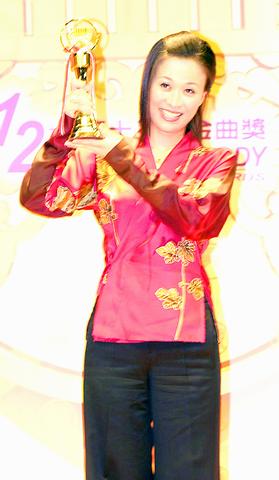In a competition in which mainstream artists with strong sales dominated, Adia (
The best album went to newcomer Jay Chou (

Na Ying (

PHOTO: TAIPEI TIMES
In the eyes of the music industry, where money is the bottom line, the male nominees are small potatoes compared to the women. "Females have much higher recognition," said Perry Ko (
Taiwan's top seller at Tower Records in 2000 was Faye Wong (

PHOTO: TAIPEI TIMES
"The market for female singers is much, much bigger than the market for the guys," said Ko. "There's kind of a weird split. Female pop singers get both guys and girls buying their albums, but male pop singers only get women buying the records."

PHOTO: TAIPEI TIMES
In a predictable award ceremony, in many categories, winners seemed to be selected on their record sales, with mainstream artists pushing out less famous names. A massive crowd attended the gathering, held for the first time in the event's 12-year history in Kaohsiung. The broadcasting rights for the event, which for the last three years have been held by TVBS, were taken for the first time by ETTV.
In an early surprise, Sun Yan-zi (

PHOTO: TAIPEI TIMES
Occasionally lapsing into English, the Singapore native said she was "surprised," "very happy," and that she appreciated the support and friendship of the other nominees.
Sun's fame has grown rapidly over the last two years, and a career comprised of only two CDs and a string of TV commercials has been sufficient to make her a star.
The conservatism of this year's Golden Melody Awards was further revealed by Chiang Hui's (
According to Ma Nien-hsien (
Sticky Rice was praised at the beginning of the award ceremony by Kaohsiung mayor Frank Hsieh (謝長廷) as "representing a new element in Taiwan." Despite this, the trend toward picking big names was working against the group. Last year, there had been criticism that many of the winners were relatively unknown in the mainstream, and this year judges seem to have gone out of their way to pick only those groups that have been moving CDs in the stores.
Speaking after receiving their award, Ah Hsin (
While there were good crowds attending the event, some members of the public did give voice to the idea that such mainstream festivals did not altogether reflect their musical interests. "I like Jay Chou (
Liu Chia-chang (劉家昌), one of Taiwan's most prolific writer of golden oldies, received a lifetime achievement award. As the writer of the hit In Praise of the Republic of China (中華民國頌) and other patriotic songs, he spoke about how, under the DPP government, people now tiptoe around the name "Republic of China." This caused some embarrassment for the presenter of the award, the deputy director general of the Government Information Office.
Another usually minor category was for Best Classical Music, in which category the soundtrack for Crouching Tiger, Hidden Dragon was knocked out of the competition because it was not pure classical music, according to the judges. Officials said that a new movie soundtrack category may be incorporated in next year's event.

April 14 to April 20 In March 1947, Sising Katadrepan urged the government to drop the “high mountain people” (高山族) designation for Indigenous Taiwanese and refer to them as “Taiwan people” (台灣族). He considered the term derogatory, arguing that it made them sound like animals. The Taiwan Provincial Government agreed to stop using the term, stating that Indigenous Taiwanese suffered all sorts of discrimination and oppression under the Japanese and were forced to live in the mountains as outsiders to society. Now, under the new regime, they would be seen as equals, thus they should be henceforth

Last week, the the National Immigration Agency (NIA) told the legislature that more than 10,000 naturalized Taiwanese citizens from the People’s Republic of China (PRC) risked having their citizenship revoked if they failed to provide proof that they had renounced their Chinese household registration within the next three months. Renunciation is required under the Act Governing Relations Between the People of the Taiwan Area and the Mainland Area (臺灣地區與大陸地區人民關係條例), as amended in 2004, though it was only a legal requirement after 2000. Prior to that, it had been only an administrative requirement since the Nationality Act (國籍法) was established in

With over 80 works on display, this is Louise Bourgeois’ first solo show in Taiwan. Visitors are invited to traverse her world of love and hate, vengeance and acceptance, trauma and reconciliation. Dominating the entrance, the nine-foot-tall Crouching Spider (2003) greets visitors. The creature looms behind the glass facade, symbolic protector and gatekeeper to the intimate journey ahead. Bourgeois, best known for her giant spider sculptures, is one of the most influential artist of the twentieth century. Blending vulnerability and defiance through themes of sexuality, trauma and identity, her work reshaped the landscape of contemporary art with fearless honesty. “People are influenced by

The remains of this Japanese-era trail designed to protect the camphor industry make for a scenic day-hike, a fascinating overnight hike or a challenging multi-day adventure Maolin District (茂林) in Kaohsiung is well known for beautiful roadside scenery, waterfalls, the annual butterfly migration and indigenous culture. A lesser known but worthwhile destination here lies along the very top of the valley: the Liugui Security Path (六龜警備道). This relic of the Japanese era once isolated the Maolin valley from the outside world but now serves to draw tourists in. The path originally ran for about 50km, but not all of this trail is still easily walkable. The nicest section for a simple day hike is the heavily trafficked southern section above Maolin and Wanshan (萬山) villages. Remains of